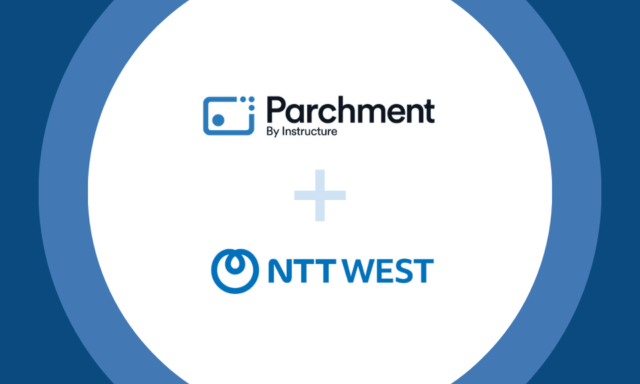
International
Parchment by Instructure and NTT West announce partnership in Japan
Parchment by Instructure is pleased to announce its partnership with NTT West in Japan.
Surely you remember the day you got your high school diploma? How about the day you graduated from college? The joy of marking these milestones tends to stay with us for decades.
And yet for all their intrinsic value — the feelings of accomplishment, the camaraderie of graduating with friends — diplomas also have practical meaning. They signify achievement, endurance, and in some cases, exceptional intelligence and skill. We tout them in face-to-face and online conversations, and highlight them in social spaces such as Facebook and LinkedIn.
So valuable are diplomas that there’s now a billion-dollar cottage industry serving fraudsters who’ll pay up to look as if they’re graduated from a prestigious institution1. That should worry us. As educators, students, administrators, and service providers we should be taking steps to preserve the sanctity of the diploma. We can do that and make the document itself more useful. First, we have to get paper out of the process.
A Paper Past is Giving Way to a Digital Future
For students entering a workforce that’s governed by digital technology, the diploma needs to be an online-accessible testimonial for the person who earned it. We won’t get there overnight, but at Parchment we’re already taking steps to make the diploma more accessible and secure, and thereby more meaningful for both students and their schools. By 2020, I expect the diploma to change in the following ways:
The diploma has been a mark of achievement for generations. It still is, and I don’t expect that to change with efforts to make the diploma a digital-first document. But with fraud on the rise, our first priority as educators and administrators is to preserve the sanctity of this vital credential. The good news is we can do that and at the same time make the diploma itself more useful for students and for issuing institutions. And we can do it by 2020.
We’ll get there by making the diploma securely shareable. We’ll also make it verifiable and infuse it with data that preserves the integrity and brand of issuing institutions. Finally, we’ll make it visual and interactive to communicate more about the experience of the student who earned it. Will it be easy? No, but at Parchment we’re committed to realizing this future. We hope you’ll join us.
Matthew Pittinsky, Ph.D. is Chief Executive Officer of Parchment. He holds a B.S. in Political Science from American University, Ed.M. in Education Policy from Harvard University Graduate School of Education and a Ph.D. in Sociology of Education from Teachers College, Columbia University.
SOURCING:
1. https://www.insidehighered.com/views/2014/07/02/essay-diploma-mills